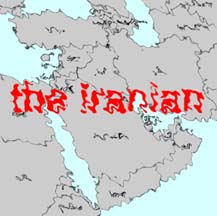 Nuclear Muscle Beach Nuclear Muscle Beach
Never before have the combination of regional atomic
arsenals and ambitions along with a global superpower’s aggressive
nuclear posture so endangered the very existence of the Middle East
July 24, 2003
The Iranian
The Middle East was under a nuclear pall long before Iran’s
successful testing of the Shahab 3 missile or the discovery of
Uranium centrifuges in Natanz. Irrespective of the cynical games
the Americans, the Israelis and other members of the nuclear club
(including the fraternal Pakistan) play with the concept of proliferation,
the fact remains that the detonation of a single nuclear device
in this environmentally sensitive region will ruin everybody’s
day.
The explosion of an “Islamic bomb” during one
of our usual neighborly brawls will be as disastrous as that of
any US-made mini-nuke or “bring-em-on,” bunker busting,
nuclear “sledge hammer.” Never before have the combination
of regional atomic arsenals and ambitions along with a global superpower’s
aggressive nuclear posture so endangered the very existence of
the Middle East.
To ward off the gathering danger of nuclear devastation, however,
the International Atomic Energy Agency's anti-proliferation
campaign is not enough. Any successful effort must be joined by
the nuclear
and
non-nuclear
powers alike.
In absence of bona fide efforts by the nuclear powers to scale
down their arsenals, technologies and doctrines an anti-proliferation
regime will be seen as an instrument of perpetuating the ill-gotten
advantage of the nuclear powers.
As long as that perception persists
and as long as nuclear reprisals remain integral to the foreign
policies of regional and global powers a genuine anti-nuclear will
will not jell at national or grassroots levels. Without an anti-nuclear
will economic arm twisting and intrusive inspections shall come
to naught.
Conversely, where there is a nuclear will there is a
nuclear way. A country like Iran that has already signed the Anti
Proliferation Treaty can be persuaded to sign its Additional Protocols
as well. But this does not keep such a country from hatching other
devious plans for a nuclear future.
Signing the Additional Protocols
will buy Iran a couple years until the deal is ratified by the
parliament. If that is not time enough, well then, ratification
could be used for amassing the needed technologies and materials
for a nuclear arsenal which could be swiftly built upon withdrawing
from the APT. If history of nuclear proliferation is anything to
go by, the next you will hear of such a country is a solemn call
for non-proliferation with brows knitted with concern for world
peace.
No nation is “Satanic” or “Evil” enough
to blow up the world or a good chunk of it on a whim -- except
in the eschatological imagination of Ayatollah Khomeini and George
W. Bush. The desire for a nuclear deterrent in a dangerous neighborhood
springs from the primal instinct for self-preservation. It has
nothing to do with whether a country is run by Mullahs or secular,
toupeed politicians.
With Iran’s public opinion pollsters
in jail I will have to go on a limb here; but I don’t think
the government’s (vehemently denied) nuclear weapons program
is unpopular. Around the Middle East, the Russians, the Indians
the Israelis, and the Pakistanis developed nuclear capabilities
not for first use but against perceived threats of American Capitalists,
Chinese Communists, and the coming hordes of Arabs or Hindus.
The
noble end of a nation’s own Manhattan Project would more
than justify the ignoble means of going underground, misleading,
cheating and stealing. The nuclear scientists and their political
patrons in these nations were convinced that developing a credible
deterrent was a sacred national duty.
Far from being considered
evildoers, defense nuclear scientists in countries like India and
Pakistan are venerated as national heroes. Once a country gains
entry to the appropriately named “nuclear club,” it
tries to keep others out; plying them with anti-proliferation platitudes
and pressuring them with the political clout of possessing nuclear
weapons.
The result is the not-so-funny comedy of the world’s
worst proliferators preaching others against dabbling in what they
alone have fully practiced. To bring this home one only needs to
recall the preposterous spectacle of the Pakistani UN representative
lecturing Iraq on developing Weapons of Mass Destruction.
Halting the proliferation of nuclear weapons is as vital to the
survival of the Middle East and the world as it has ever been.
A regional Green sentiment at both grassroots and national political
levels will be crucial for achieving this goal. But such a movement
can not go far without the good will of the nuclear powers and
their return to conducting the business of anti-proliferation through
diplomacy rather than threats.
People of the Middle East and the
world need a new wave of anti-nuclear activism. They deserve a
global nuclear de-escalation. Stopping America’s new generation
of nuclear devices meant to be used against non-nuclear powers
would be a step. As long as certain members of the nuclear club
flex their muscles and kick sand in the eyes of others, bomb-building
kits will remain popular on the world’s muscle beach. Author
Ahmad Sadri is Professor and Chairman of the Department
of Sociology and Anthropology
at Lake Forest
College, IL, USA. See
Features .
See Homepage
* Send
this page to your friends

|